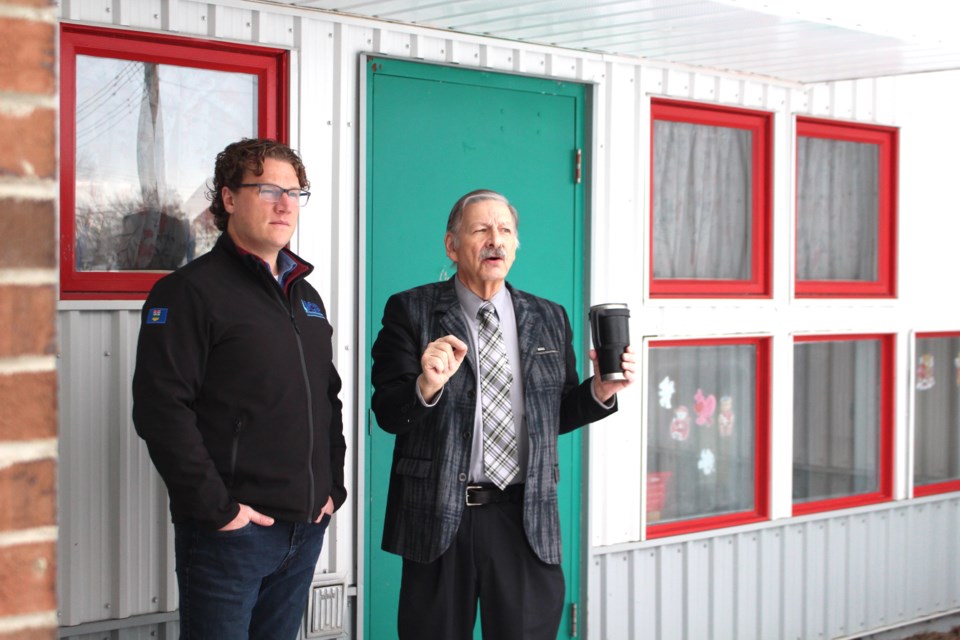LAKELAND – On Friday, Alberta’s minister of seniors, community and social services, Jeremy Nixon, travelled through the Lakeland, making stops at Family and Community Support Services (FCSS) offices in Cold Lake, Bonnyville and St. Paul.
Although these visits were not open to the public and lasted around 30 minutes each, the stops allowed for the region’s FCSS staff and municipal leaders to share the work being carried out at the community centres.
In Bonnyville, the minister’s visit included a tour of the bustling FCSS building followed by a round table discussion that included the constituency’s MLA David Hanson, the mayor of the Town of Bonnyville Elisa Brosseau and MD of Bonnyville Reeve Barry Kalinski, town council members, community service stakeholders, as well as the current and former FCSS executive director Rachelle Lavoie and David Beale.
While the meeting was positive and upbeat, Bonnyville FCSS representatives did not hold back when it came to discussing ongoing challenges seen through the pandemic by FCSS staff. Many of those challenges are ongoing.
Disruptions to Alberta Supports caused by pandemic moved the majority of provincial workers out of community offices, shifting to online support, posing a significant barrier for many Lakeland residents, expressed Lavoie.
During the pandemic, FCSS centres became an unofficial catchment basin for essentially all community members seeking services, even though cases fell under the purview of the province or federal governments.
“For clients that should have been going to Alberta Supports, but for a multitude of reasons gravitated towards us when [provincial employees] were working from home and nobody was really in the office at Alberta Supports – we were still here,” she told the minister.
“But even when people weren't working from home, they would often just send them our way, because they knew that we would help them.”
In 2022 alone, one of Bonnyville FCSS’s key staff members assisted about 200 individuals for matters related directly to Alberta Supports. These visits ranged anywhere between 15 minutes to an hour per client, Lavoie said, adding “that can easily translate to dollar amounts.”
The mandate of Alberta Supports is to help Alberta residents access the province’s 30 plus programs and 120 services for seniors, people with disabilities, job seekers, parents and families, homelessness, financial assistance, abuse, and family violence prevention.
For FCSS staff who have had to pivot to assist community members seeking assistance with a wide range of unique needs, it has shifted the focus of what the organization’s scope is based on necessity.
FCSS centres are meant to focus on locally driven “preventative social services” through a partnership between the province and municipalities.
“For us being in the system, using it and it being such a challenge, I can't imagine how it must be as a user of the system trying to navigate [Alberta Supports]. And I don't blame individuals for wanting to utilize us because we don't turn people away,” said Lavoie. “That's kind of our unofficial motto. If you're coming to the door, we are going to try to figure out how to help you.”
Concerns over FCSS staff filling the gap was also a top talking point for St. Paul FCSS representatives who met with Minister Nixon next.
“Through COVID, most provincial entities closed,” Lynn Smid, the director of St. Paul’s FCSS, told Lakeland This Week. “So, people went to where they knew they could get support – FCSS.”
Part of what Smid had hoped for through the meeting with the minister was to get recognition for the slack that FCSS staff picked up in order to fill gaps in provincial services.
“While Cold Lake, Bonnyville and St. Paul work together and have a lot in common, we are unique and locally and municipally driven,” Smid said. “Rural FCSSs function differently and our programs look different in rural areas because the access to services is different.”
Smid added that the visit was important because the minister needs to learn about the different challenges faced by each FCSS and the differences that exist for residents when accessing services in rural communities.
What made the meeting constructive, however, was that “he listened,” she said.
Added services cost money
FCSS centres run based on grants provided by the province to municipalities. Provincial FCSS grants must be funded at least 25 per cent by the municipality. When provincial funding increases, so too must the amount contributed by the local municipality.
“The funding formula is based on population with adjustments for social factors,” according to information from the province.
Both Smid and Lavoie noted that since the start of the pandemic, FCSS centres have stepped up and taken on far more work. “While the ask for support has increased, the compensation hasn’t,” said Smid.
She added that the last time the St. Paul FCSS saw an increase in provincial funding was in 2016. In Bonnyville, it was stated that 2014 was the last time FCSS saw a bump in funding.
During the meetings, both the St. Paul and Bonnyville groups expressed that the centres could use extra provincial funding to assist with the programs they were designed to deliver, while they continue to help residents who are navigating other complex services.
After meetings with Lakeland FCSS centres, Nixon provided a statement to Lakeland This Week.
“Having spent most of my career working in the non-profit sector, I have a strong appreciation for community organizations supported through the FCSS program. By visiting the constituency of Bonnyville-Cold Lake-St. Paul with the local MLA, David Hanson, I was able to see and hear firsthand some of the great work being done in that area. I look forward to continuing our government’s partnership with the FCSS regional boards of Cold Lake, Bonnyville and St. Paul and ensuring they get the support they need to continue supporting the communities,” Nixon said.
Nixon was appointed to the role of minister of seniors, community and social services on Oct. 24, 2022.



